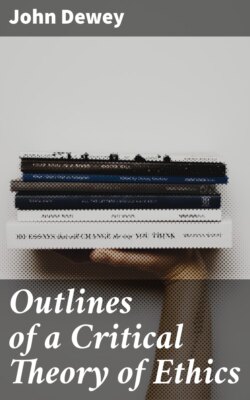Читать книгу Outlines of a Critical Theory of Ethics - Джон Дьюи - Страница 17
На сайте Литреса книга снята с продажи.
XI.
ОглавлениеThe Hedonistic Position Supported.
Hedonism holds that pleasure is both the natural end and the proper criterion of action:
The following quotation from Bentham (Principles of Morals and Legislation, Works, Vol. I, p. 1) gives a statement of both these elements. "Nature has placed man under the governance of two sovereign masters, pain and pleasure. It is for them alone to point out what we ought to do, [i. e. they are criteria] as well as to determine what we shall do [motives]. On the one hand, the standard of right or wrong [criterion]; on the other the chain of causes and effects [motives], are fastened to their throne."
1. Pleasure as Criterion. That the tendency of an action to produce pleasure is the standard for judging its moral value is generally held by the hedonists to be so axiomatic as to be beyond argument.
See Bain, Moral Science, p. 27. "The ultimate data must be accepted as self-evident: they have no higher authority than that mankind generally are disposed to accept them.... Now there can be no proof offered for the position that happiness is the proper end of all human pursuits, the criterion of all right conduct. It is an ultimate or final assumption to be tested by reference to the individual judgment of mankind." So Bentham, Enquiry I, II, "The principle is not susceptible of direct proofs for that which is used to prove everything else can not itself be proved; a chain of proofs must have their commencement somewhere." Mill, Utilitarianism. (Dissertations and Discussions, pp. 348-349). "The only proof capable of being given that an object is visible is that people actually see it. In like manner the sole evidence it is possible to produce that anything is desirable is that people do actually desire it." See Stephen, Science of Ethics, p. 42; Spencer, Data of Ethics, pp. 30-32 and p. 46; Lotze, Practical Philosophy, pp. 18-19: Sidgwick, Methods of Ethics, pp. 368-369.
Hedonism, then, represents the good or the desirable and pleasure to be two names for the same fact. What indeed can be worth while unless it be either enjoyable in itself or at least a means to enjoyment? Would theft be considered bad if it resulted in pleasure or truth itself good if its universal effect were pain?
2. Pleasure as object of desire. It is also urged that psychological analysis shows that pleasure is not only the desirable, but also always the desired. Desire for an object is only a short way of saying desire for the pleasure which that object may bring. To want food is to want the pleasure it brings; to want scientific ability is to desire to find satisfaction, or attain happiness. Thus it is laid down as a general principle that the invariable object of desire, and motive of action is some pleasure to be attained; the action itself and the direct end of action being simply means to pleasure.
For a strong statement of this doctrine see Mill, Op. cit., pp. 354-5. "Desiring a thing and finding it pleasant, aversion to it and thinking of it as painful, are phenomena entirely inseparable, or rather two parts of the same phenomenon,—in strictness of language, two different modes of naming the same psychological fact; to think of an object as desirable and to think of it as pleasant are one and the same thing." See also, Bain, Emotions and Will, p. 436, Senses and Intellect, pp. 338-344; Sully, Outlines of Psychology, p. 575, "The inclination or tendency of the active mind towards what is pleasurable and away from what is painful is the essential fact in willing." Also pp. 576-577.
